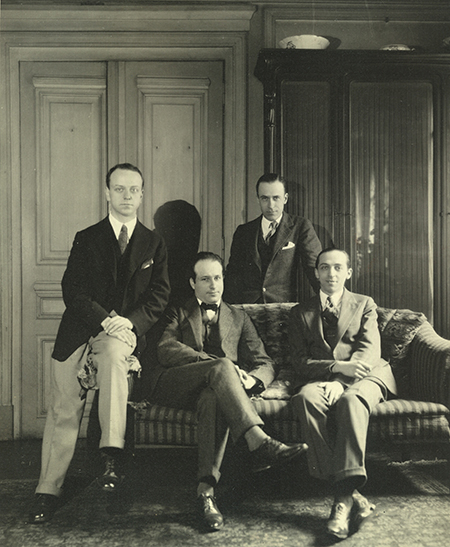IN THIS EDITION:
. Charnofsky’s playlist, new LD episode
. Chamber Choir auditions
. Almanac: remembering Herbert Elwell
HAPPENING TODAY:
2:00 pm – 4:00 pm – Not Your Grandmother’s Classical Music: hosted by Eric Charnofsky. Featured music: John Harbison’s Seven Poems of Lorine Niedecker (soprano/piano), Paul Lansky’s Talking Guitars (guitar duet), Carl Stamitz’s Symphony in C, David Maslanka’s Sonata for Alto Saxophone and Piano, John Carollo’s Awakenings for String Orchestra & Charles Villiers Stanford’ s Sonata Eroica in g for Organ. Click here to listen to the internet feed: or tune in to 91.1 FM in the greater Cleveland area.
7:30 pm – Les Délices — SalonEra 3.7: Ximenez: Music & Politics. Karin Cuellar-Rendon and the Ximenez Quartet trace the early nation-building efforts of 19th-century Latin American composers Pedro Ximénez Abril Tirado (Bolivia-Peru), José Bernardo Alzedo (Chile), and Chiquinha Gonzaga (Brazil) who integrated elements of the European classical tradition with local musical genres. Available online and as a podcast. Episodes stream free from their premiere date thru June 30, 2023. Click here.
AUDITION NOTICE:
The Cleveland Chamber Choir announces open auditions for their upcoming 2023-2024 Season. More information on the choir, the audition requirements and how to sign up can be found on their website.
TODAY’S ALMANAC:
In earlier years, we’ve featured American composer Adolphus Hailstork, born on this date in Rochester, NY in 1941, and Canadian composer and conductor Srul Irving Glick who wrote finis to his career in Toronto in 2002. Today, let’s visit the career of composer and music critic Herbert Elwell, who passed away in Cleveland on this date in 1974 at the age of 75.
Born in Minneapolis, after studies with Ernest Bloch, Elwell was among the first American students of Nadia Boulanger in France along with Aaron Copland, Walter Piston, and Virgil Thomson (pictured chez Boulanger above, L-R: Thomson, Piston, Elwell, Copland). He joined the composition and theory faculty at the Cleveland Institute of Music from 1928-1945, then taught at the Oberlin Conservatory for nine years.
Among the orchestra conductors who championed Elwell’s orchestral compositions were Rodzinsky, Stokowski, Steinberg, and Hanson, and he was awarded the first Cleveland Arts Prize for Music in 1961.
Elwell served as music critic for the Cleveland Plain Dealer from 1932-1964, and participated in the University of Southern California’s Project for the Training of Music Critics, a program that brought dance and music critic Wilma Salisbury to The Plain Dealer. Salisbury wrote Elwell’s bio for the Arts Prize, which is full of pithy Salisburyisms.
In his Sunday columns for the Plain Dealer, which he served as music critic for 32 years, the composer praised the soprano [Marie Simmelink Kraft] so effusively that executive editor Philip W. Porter once admonished him to stop making love to Mrs. Kraft in print. Elwell impishly replied, “Would you prefer that I make love to her out of print?”
During the reign of George Szell, Elwell did not hesitate to take the imperious music director to task. In one review, he described Szell’s Germanic interpretation of Debussy’s La Mer as Das Mer.
One of Elwell’s earliest pieces, Quintet for Piano and Strings (1924), won more praise in Paris than George Gershwin’s Rhapsody in Blue, which was premiered on the same concert.
One of the most enduring images of Elwell was penned in 1964 by a Plain Dealer editorial writer, who characterized him as “raconteur, linguist, teacher, and, although Minneapolis-born, possessor of a certain Old World charm that gives a vague impression that he is carrying a walking stick and wearing an Inverness cape. Herb Elwell . . . a man apart.”
Salisbury’s bio of Elwell notes that
Following his death in 1974, Elwell’s widow Maria gave his manuscripts, published scores and papers to the Cleveland State University Library. In 1979, the catalogued materials were made available via the On-Line Computer Library Center.
Enterprising scholars, conductors, and performers should have a look at the collection — if they can find it. A search today proved elusive.
While looking, click here to listen to what is said to be one of Elwell’s most popular scores, the suite from his ballet The Happy Hypocrite (1925) as performed by the Cleveland Pops Orchestra conducted by Louis Lane “from a long out-of-print LP released in 1961 and never transferred to CD. At the time of this recording, the Cleveland Pops Orchestra was essentially the same as the Cleveland Orchestra.”




